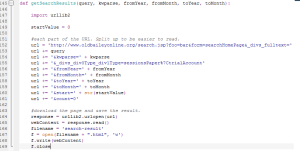Before taking this class I’d never even heard of, let alone worked with the Python programming language or Komodo Edit. In fact, other then a bit of minor programming that I used in high school, I have mostly steered clear of it for lack of understanding and failing to see how knowing how to write programming language could possibly benefit me as a History major. However, having worked through the lessons found on the Programming Historian website, I found that there are actually ways to manipulate texts using the Python language to assist in researching .
As computers are able to process information many times faster than a human can, using computers to assist in researching can be a very good time saving tool if you know what you are doing. Working through the lessons in the Programming Historian modules allowed me to create a program that would cut out stop-words, punctuation and similar unnecessary information in order to create a list of word frequencies that allowed me to get a general idea of what the article was about. Is this really useful though as such tools already exist without having to do the programming yourself? Perhaps not, but it was still certainly interesting to see how these tools work and to learn that I could also create such tools with a little work.
The biggest problem I found working with the Programming Historian was the layout of the lessons. Sometimes while working through the lessons they do not specify where to enter parts of the code which I found confusing as my codes would not work despite following them exactly. For the most part I was able to find out my mistakes later on in the lesson as it became clear what I’d doe wrong but it would have been nice if the lessons were more specific as you work through it rather then waiting to the end to clarify what you’re doing. Ultimately I was only able to complete lesson five before getting completely stuck on lesson six to the point where I could not figure out where I’d gone wrong. I even went back over the line of code that created the error message and compared it to the code in the lesson to no avail. Perhaps if I was better versed in the Python programming language I could’ve caught my own mistake.
Ultimately I found Python very interesting and it was cool to see what you could create yourself using the programming language and it is definitely a very useful tool. However in the end I found the Programming Historian confusing and aggravating to use.











